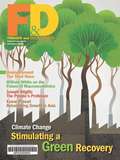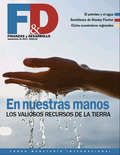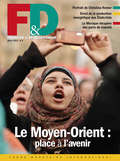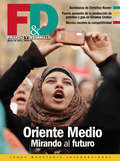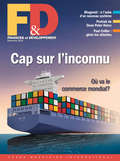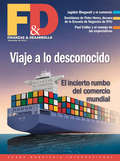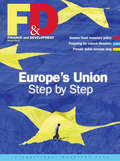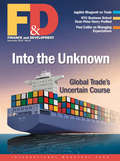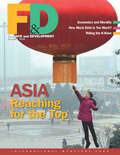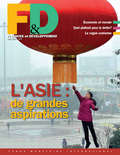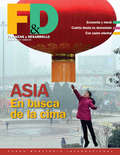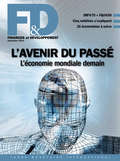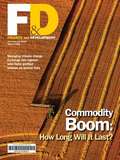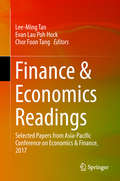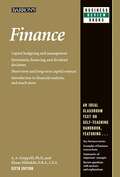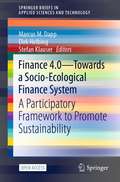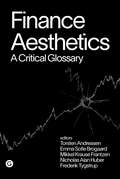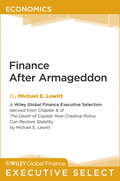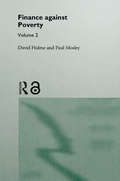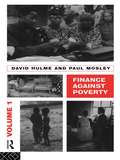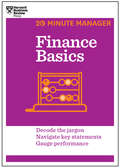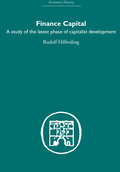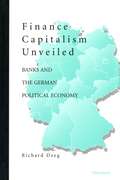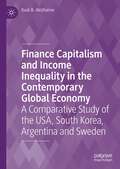- Table View
- List View
Finance & Development
by Jeremy Clift Marina Primorac Hyun-Sung KhangThis publication gathers together articles, that have appeared in Finance & Development over the past eight years, which dealt with the inplications of, and responses to, globalization. The focus is on financial globalization, including the policy implications of the huge growth in cross-border capital flows.
Finance & Development (EPub)
by International Monetary FundThe September 2008 issue examines key issues facing low-income countries, including how they should respond to high oil and food prices. Some African economies are now successfully attracting international investors and are seen as a new tier of "frontier" emerging markets. Separate articles look at problems of aid effectiveness, aid predictability, and aid fragmentation. Other articles include an account by Eswar S. Prasad and Raghuram G. Rajan of their new report on financial sector reforms in India; Martin Ravallion and Dominique van de Walle draw lessons on reducing poverty from Vietnam's agrarian reforms; Sanjeev Gupta and Shamsuddin Tareq make a strong case for sub-Saharan countries to mobilize their domestic revenue bases. In addition, Simon Willson profiles Beatrice Weder di Mauro, the first woman on Germany's Council of Economic Experts; and the outgoing IMF Chief Economic Simon Johnson talks about the new drivers of global growth-emerging markets.
Finance & Development (EPub)
by John TaylorCommodity Boom: How Long Will It Last?" asks how economies will fare after the record-high prices of key raw materials posted in recent months, which build on dramatic increases from their lows of 2000. The lead article warns that the impact on headline inflation levels might persist throughout 2008, even without further commodity price hikes. It urges policymakers to ensure efficient functioning of market forces at the global level, and to move swiftly to protect the poorest. Another article addresses the effects of climate change on agriculture, warning that farm production will fall dramatically-especially in developing countries-if steps are not taken to curb carbon emissions. Other articles on this theme argue that policies to reduce greenhouse gas emissions need not hobble economies, and that financial markets can help address climate change. "People in Economics" profiles John Taylor; "Picture This" says the global energy system is on an increasingly unsustainable path; "Country Focus" spotlights South Africa; and "Straight Talk" examines early warnings provided by credit derivatives. Also in this issue, articles examine China's increasing economic engagement with Africa, and the outsourcing of service jobs to other countries.
Finance & Economics Readings: Selected Papers From Asia-pacific Conference On Economics And Finance 2017
by Lee-Ming Tan Evan Lau Poh Hock Chor Foon TangThis book is a compilation of the best papers presented at the 2017 installment of the Asia-Pacific Conference on Economics & Finance (APEF), which is held annually in Singapore. With a great number of submissions, it presents the latest research findings in economics and finance and discusses relevant issues in today's world. The book is a useful resource for readers who want access to economics, finance and business research focusing on the Asia-Pacific region.
Finance (Barron's Business Review Series)
by Ehsan Nikbakht DBA, CFAThis updated edition defines and explains key financial terms and discusses topics that include Business types and taxation methods The value of money over time Capital budgeting Investing and financingDividend policy Investment decisions based on financial derivatives Financial analysis Managing working capital Analyzing financial statements Using financial software, and much more. Books in Barron’s Business Review Series are intended mainly for classroom use, and include review questions with answers. They make fine supplements to main texts when included in college-level business courses.
Finance 4.0 - Towards a Socio-Ecological Finance System: A Participatory Framework to Promote Sustainability (SpringerBriefs in Applied Sciences and Technology)
by Dirk Helbing Marcus M. Dapp Stefan KlauserThis Open Access book outlines ideas for a novel, scalable and, above all, sustainable financial system.We all know that today’s global markets are unsustainable and global governance is not effective enough. Given this situation, could one boost smart human coordination, sustainability and resilience by tweaking society at its core: the monetary system? A Computational Social Science team at ETH Zürich has indeed worked on a concept and little demonstrator for a new financial system, called “Finance 4.0” or just “FIN4”, which combines blockchain technology with the Internet of Things (“IoT”). What if communities could reward sustainable actions by issuing their own money (“tokens”)? Would people behave differently, when various externalities became visible and were actionable through cryptographic tokens? Could a novel, participatory, multi-dimensional financial system be created? Could it be run by the people for the people and lead to more societal resilience than today’s financial system (which is effectively one-dimensional due to its almost frictionless exchange)? How could one manage such a system in an ethical and democratic way? This book presents some early attempts in a nascent field, but provides a fresh view on what cryptoeconomic systems could do for us, for a circular economy, and for scalable, sustainable action.
Finance Aesthetics: A Critical Glossary (Goldsmiths Press / PERC Papers)
by Torsten Andreasen, Emma Sofie Brogaard, Mikkel Krause Frantzen, Nicholas Alan Huber, and Frederik TygstrupA unique, critical, and creative encyclopedia from scholars, artists, and writers on the world and words of finance capital.What does finance capital look like? How do the push and pull of debt and credit shape our feelings and relations? Across fifty-five unforgettable entries, Finance Aesthetics: A Critical Glossary offers an unorthodox appraisal of our bizarre, distorted contemporary condition.
Finance After Armageddon (Wiley Global Finance Executive Select #141)
by Michael E. LewittThis chapter from The Death of Capital is a call for change that discusses projects and initiatives to rejuvenate the economy and provide a basis for sustained growth. We have developed a regulatory system that does exactly the opposite of what it should be doing-favors speculation over production; obscurity over transparency. This chapter addreses hot-button topics including: How to Improve Capital Adequacy Executive Compensation Reform Modern Monetary Policy and Regulation Enhancing Financial Transparency Solutions for Credit Default Swaps, Derivative, and Structured Investment Vehicles
Finance Against Poverty: Country Case Studies
by Hulme David Paul MosleyOver the last decade, the theory that poverty in the world's poorest regions could be alleviated by providing small loans to micro-entrepreneurs has become increasingly popular. This volume examines the effectiveness of this theory when put into practice. The book presents empirical evidence drawn from comparative experiences in seven developing countries and produces some startling conclusions. This work should be essential reading for all those interested in development, poverty-reduction, social welfare and finance. Volume One provides a detailed analysis of this theory and offers policy recommendations for practitioners in the field.
Finance Against Poverty: Volume 1
by Hulme David Paul MosleyIn two volumes these books review and expand the theory that poverty in the world's poorest regions could be alleviated by providing small loans to micro-entrepreneurs. Volume 1 provides detailed analysis of this theory and offers policy recommendations for practitioners in this field. Volume 2 presents empirical evidence drawn from comparative experiences in seven developing countries. The work assesses the success of this policy and provides some startling conclusions. This is essential reading for all those interested in development, poverty-reduction, social welfare and finance.
Finance Basics (20-Minute Manager Series)
by Harvard Business ReviewIntimidated by corporate finance? The numbers (and the jargon) can feel overwhelming-but you have to understand them to manage effectively. Finance Basics explains the fundamentals simply and quickly, introducing you to key terms and concepts such as: How to navigate financial statements How to weigh costs and benefits What's involved in budgeting and forecasting How to gauge a company's financial healthAbout HBR's 20-Minute Manager Series:Don't have much time? Get up to speed fast on the most essential business skills with HBR's 20-Minute Manager series. Whether you need a crash course or a brief refresher, each book in the series is a concise, practical primer that will help you brush up on a key management topic.Advice you can quickly read and apply, for ambitious professionals and aspiring executives-from the most trusted source in business. Also available as an ebook.
Finance Capital: A study in the latest phase of capitalist development
by Rudolph HiferdingThis is the first English translation of one of the classical works of Marxist economic theory. When Rudolf Hilferding’s Finance Capital was first published in 1919 it was acclaimed by reviewers as a continuation of Marx’s Capital, and it has a major influence upon subsequent Marxist thought, especially in the analysis of imperialism where it provided some of the fundamental ideas for the theories of Bukharin and Lenin. But Hilferding’s work was much more than a study of imperialism, which was presented only in the last section of the book. It set out to examine the main tendencies in the development of the capitalist mode of production as a whole at the beginning of the twentieth century, beginning with an exposition of the theory of money (in which particular attention was paid to the growth of credit money), then analysing the increasingly important role of the banks in the mobilization of capital, along with the development of large corporations, cartels and trusts, and finally outlining a theory of economic crises. Hilferding’s book has, however, more than an historical interest. It is a model for any renewed attempt to understand the ‘latest phase of capitalist development’ in the closing decades of the twentieth century, and Hilferdin’s ideas still provide essential elements for the elaboration of theoretically enlightened and realistic policies in the socialist movement.
Finance Capitalism Unveiled: Banks and the German Political Economy
by Richard DeegIf we are moving toward one global financial market, will all national financial systems that determine how businesses raise money look the same? Richard Deeg argues that, despite financial market integration and considerable harmonization in the regulation of financial markets, the traditional structure and economic functions of national financial systems are not inevitably undermined. Using the case of Germany--a country with a strong and distinctive financial sector that is at the center of the pressures of economic integration--the author shows how the unique aspects of the German financial sector and its relationship to the German economy have persisted notwithstanding powerful pressures to change. Posing the German model of coordinated capitalism in which banks play an important role in shaping both firm behavior and the possibilities for state intervention in the economy against the liberal model of the United States and Britain in which the securities markets play a much greater role than banks, Deeg shows how the German model has survived competitive pressures in the international economic system that have pushed Germany--and other countries--toward the liberal model. This book will appeal to political scientists and economists interested in international financial markets, globalization, and the comparative study of domestic financial markets, as well as in German politics and the German economy. Richard Deeg is Assistant Professor of Political Science, Temple University.
Finance Capitalism and Income Inequality in the Contemporary Global Economy: A Comparative Study of the USA, South Korea, Argentina and Sweden
by Kuat B. AkizhanovThis book explores the causes of rising income inequality within industrialised, developing, and emerging economies. The development of finance capitalism over the last 40 years is charted to highlight how the neoliberal restructuring of national and global economies has driven income inequality. With case studies from the USA, South Korea, Argentina, and Sweden, a comparative analysis is presented to reveal how financialisation facilitates uneven capital accumulation and generates conditions that increase income inequality.This book aims to outline an analytical framework for a financialisation-induced income inequality nexus. It will be relevant to students and researchers interested in the political economy and financial economics.
